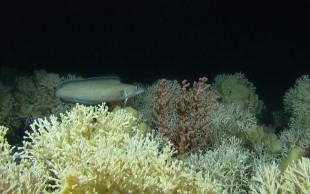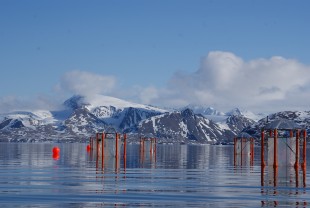
Consequences of C02 uptake in the oceans
Richard Bellerby fra Bjerknes Centre for Climate Research ved Universitetet i Bergen holder det første foredraget Akademiets klimaserie i høst under tittelen "Consequences of C02 uptake in the oceans."

Kommentator: Knut Bjørlykke, professor i geologi, Universitetet i Oslo
Foredrag: Richard Bellerby, Bjerkes-senteret ved Universitetet i Oslo
Om foredraget:
Large-scale changes in a master variable of the ocean - how are increasing CO2 uptake and ocean circulation patterns altering ocean pH and what may be long-term consequences for marine systems and ocean-climate feedback?
Consequent to the increase in the atmospheric load of carbon dioxide (CO2), due in large to anthropogenic carbon release, there has been an increase in the oceanic carbon reservoir. At the air-sea interface, the productive, euphotic surface ocean is a transient buffer in the process of ocean-atmosphere CO2 equilibrium, a process retarded by the slow mixing of the surface waters with the intermediate and deep ocean. As such, the greatest changes to the CO2 system are occurring in the surface waters. This build up of CO2 is already altering the carbonate chemistry of the oceans and projections on decadal to centennial timescales point to changes in seawater pH and carbonate speciation that may have ramifications for the success of organisms or whole marine ecosystems. This presentation will introduce the concept of ocean acidification, describe the present rate of change of the marine carbonate system and its regionality and discuss scenarios of change over the next decades. I will show some examples of marine organismal and ecosystem responses to ocean acidification.

Om klimaseminarene som arrangeres i høst:
- 10. november: "Tenke langt og handle rett. Svikter standard økonomisk tenkemåte i klimapolitikken?" Innledning ved Olav Gjelsvik
- 17. November: "Utviklingen av norsk klimapolitikk, Hvorfor går det så sent?" Innledning ved Jørgen Randers.
Kveldsseminarene blir som vanlig holdt i Vitenskapsakademiets lokaler, Drammensveien 78, klokken 18.00 - 20.00 og er åpne for alle interesserte.
- Les mer om Akademiets klimautvalg og møtene:http://www.dnva.no/c45014/seksjon/vis.html?tid=45015
Akademiets klimautvalg ledes av professor Nils Roll-Hansen.